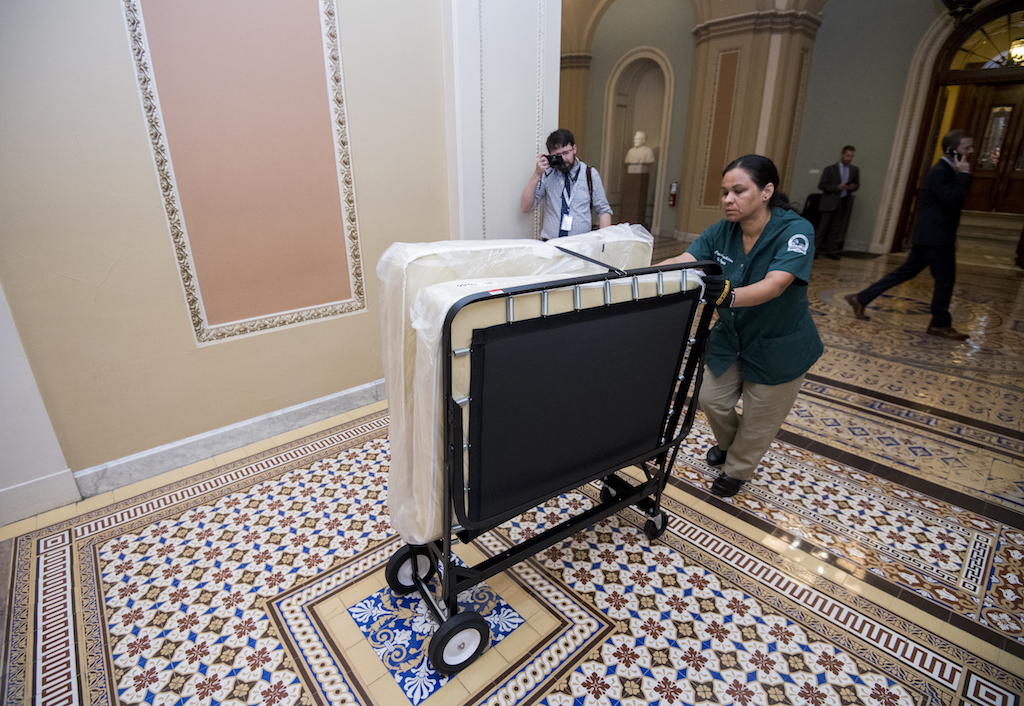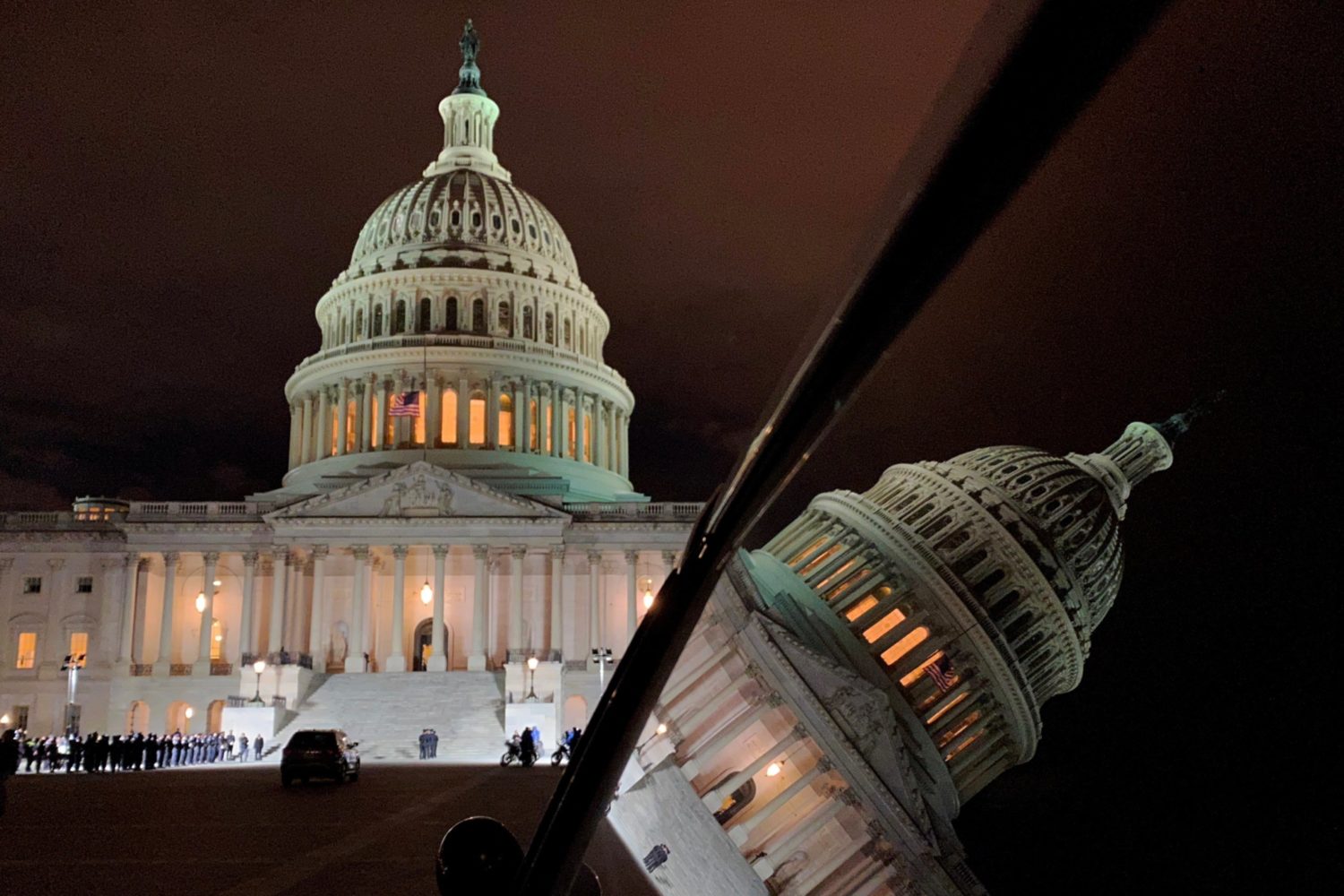For a couple decades now, we’ve been accustomed to the occasional reminder that some members of Congress—mostly Republicans, but a few Democrats, too—try to keep their anti-Washington purity intact by sleeping in their offices while they’re in session, rather than find more, ahem, normal accommodations around Washington. It’s one of those moves that has the dual appeal of sticking it to the DC establishment and proving some level of frugality to the voters back home.
But Politico reported Tuesday that some in Congress, specifically members of the Congressional Black Caucus, are sick of seeing their colleagues use Capitol office buildings as adult dormitories. The CBC members asked the House Ethics Committee last December to look into the office-bunking trend, and decided to go public now after not getting a response. “There’s something unsanitary about bringing people to your office who are talking about public policy where you spent the night, and that’s unhealthy, unsanitary—and some people would say it’s almost nasty,” Representative Bennie Thompson of Mississippi told Politico.
If previous complaints about members crashing on rollaways and bathing in the Capitol gym are any guide, though, this latest effort won’t change things. The number of representatives who sleep in their offices seems to grow with each successive Congress, with objections shuffled away. A 2011 complaint by the good-government group Citizens for Responsibility and Ethics in Washington that at least 33 members were using the Capitol as a “frat house” didn’t move things; even since becoming speaker in 2015, Paul Ryan continues to spend most of his DC nights snoozing a few feet away from where he conducts his legislative business. “It actually makes me more efficient,” Ryan tells Politico.
Whether they sleep in their offices out of convenience, frugality, or performative animosity toward Washington, the members who are doing it are really doing themselves and their constituents a disservice. The problem is, members of Congress aren’t going to change their housing preferences unless they have some kind of incentive. And oddly enough, it was Jason Chaffetz, a DC-flogging office-sleeper who suggested that members get a certain amount of money each month for living expenses while they’re in Washington.
Chaffetz, before leaving Congress last year for a more lucrative career complimenting the President on Fox News, suggested members of Congress get $2,500 per month to help defray the costs of maintaining a DC residence. He was ridiculed, but mostly because he was a poor vessel for that kind of suggestion—remember, this is the guy who suggested that low-income people be forced to choose between making health-care payments and mobile-phone plans. But Chaffetz wasn’t entirely wrong when he pointed out that it can be a burden to maintain dual residences in a home state and Washington, one of the country’s most expensive housing markets.
Mocking Chaffetz’s suggestion is easy: members of Congress earn $174,000 per year, and most of them are pretty well off to begin with. Congress’s median net worth is about $500,000, according to CQ Roll Call, with at least 207 millionaires currently in office. But whether or not they bring their families with them—and fewer are, as a trend line toward fewer working days every year means more time for members to be in their home states—renting or buying a place in Washington isn’t cheap.
As I wrote last year, though, after Chaffetz explained why he slept in his office, that’s why the US should take a page from some of its allies and set aside part of the compensation paid to members of the national legislature for housing while they’re in the capital. British MPs earn a base salary of 76,011 pounds ($105,577), and can expense up to 22,760 pounds ($31,613) for London-area accommodations. Applied here, lawmakers whose districts lie within, say, a 50-mile radius of DC don’t need a second home, but the vast majority can’t be daily commuters. The French National Assembly specifies that 3 percent of the 7,210 euro ($8,948) salary members get every month be used for housing. That only comes out to 216 euros a month, but deputies also get a few thousand euros a month for additional work-related expenses, including lodging.
In case it’s too distasteful to give members of Congress a line item in their compensation dedicated to DC-area residential costs, other countries have dedicated housing for far-flung members of their national legislatures. Delhi has a neighborhood of early-20th-century bungalows for members of the Indian Parliament; members of Sweden’s Riksdagen who live more than 50 kilometers from Stockholm can stay in state-owned housing (or be reimbursed for other lodging); Myanmarese MPs live in dorms when they’re in session, though those accommodations—especially the rooms used by members of opposition parties—have been compared to jail cells.
In short, though, legislators sleeping in their offices appears to be a uniquely American problem. Evicting them from the Capitol, whether to hotels, state-owned apartments, murky concrete boxes, or second homes of their own would make the United States a bit more normal among democracies and Washington a bit less peculiar among world capitals.




















